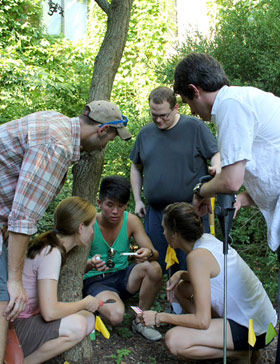Grant fuels 'back-to-nature' approach to teacher education
By Craig Cramer

With help from a nearly $300,000 grant from the National Science Foundation (NSF), the Cornell Teacher Education (CTE) program will transform how it prepares new teachers to educate the next generation of scientists -- and citizens.
"To inspire budding scientists and to ensure scientific literacy for everyone, we need teachers who see science everywhere -- who can see the world in a blade of grass, to paraphrase Blake and Whitman," says Bryan Duff, lecturer in the CTE program, which offers teacher certification in the sciences, a Master of Arts in Teaching and an undergraduate minor.
CTE is taking a back-to-nature approach to science education that builds on traditions dating back to the Nature Study Movement, pioneered in part by Liberty Hyde Bailey and Anna Botsford Comstock at Cornell in the mid-19th century.
"Local natural environments are underused in science education," says Duff. "Biology and earth science are obvious candidates for taking science outdoors, but we believe that chemistry and physics -- areas where new teachers are desperately needed -- also can benefit from this approach."
Taking science outdoors increases student engagement and helps them understand the messy nature of science in the real world and appreciate the power of interdisciplinary approaches, Duff adds.
The capacity-building grant from the NSF's Robert Noyce Teacher Scholarship Program will help CTE work with university scientists, informal science educators, outdoor educators, secondary science teachers and others to develop new curricula and redesign courses to help teachers in training learn how to use nature as their classroom. It also will support internships and summer teaching opportunities at rural and urban secondary schools to help them put what they've learned into practice.
"We're committed to making this approach work for all students, including those in cities where access to nature may be limited and those with disabilities that may challenge their access and success," says Duff. This has led to collaborations with the ILR School's Employment and Disability Institute and other experts to help overcome accessibility barriers.
CTE also is forging links with groups both on and off campus to provide practical experiences for CTE students and to help recruit new students to the program. Collaborations include:
"We will help our CTE students tap into these opportunities to hone their craft," says Duff. "But there are other students who may discover through these programs that they truly love teaching, and we can help them pursue that professionally."
Associate Professor Cole Gilbert, Department of Entomology, is the grant's principal investigator. Other investigators are Linda Rayor (entomology), Robert Ross (Paleontological Research Institution), Travis Park and Jeff Perry (CTE), and Nancy Hinkley (ILR School, Employment and Disability Institute).
Craig Cramer is a communications specialist in horticulture.
Media Contact
Get Cornell news delivered right to your inbox.
Subscribe